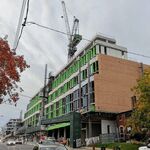Wait for new streetcars could grow
Published On Fri Jul 29 2011
The first of the new Bombardier LRVs that will ply downtown streets are expected to arrive in 2013 - unless city hall decides to delay them to save cash.
Supplied rendering
Tess Kalinowski Transportation Reporter
The TTC is looking at dismantling its historic $1.25 billion contract with Bombardier for a new streetcar fleet — about a year before the first of the sleek new European-style vehicles are scheduled to arrive in Toronto.
Two years ago, former Mayor David Miller unsuccessfully waged war with Ottawa over paying for the 204 low-floor streetcars. When the federal government refused to chip in, Miller persuaded city council to commit Toronto to two-thirds of the funding, about $834 million. The province is paying one-third.
But now the city has ordered the TTC to look at ways of eliminating a $1.5 billion capital shortfall over the next decade.
Among the options is asking Metrolinx to buy the 204 streetcars, amortizing the cost over a longer period and allowing the TTC to lease them, said TTC chair Karen Stintz.
The commission is also pondering the implications of delaying delivery beyond the current window of 2013-2019 — something that could mean less reliable service for the city’s 250,000 daily streetcar riders, who have been anticipating a roomier, more comfortable ride.
Stintz said the idea is still “very preliminary,” and no call has been made to the province.
It’s unclear how much money delaying delivery would actually save, given the deteriorating condition of the existing 35-year-old fleet. The TTC struggles to keep enough of them running to service all 11 downtown routes and has occasionally resorted to using buses.
Delaying delivery would mean renovating the existing cars, slicing the potential savings.
The streetcar order is one of the last remnants of Miller’s transit legacy. To find the extra $417 million needed when Ottawa snubbed Toronto, the TTC deferred six other projects.
Now with only $5.5 billion available for capital needs of $7 billion through 2021, the TTC is faced with tough decisions, said TTC chief general manager Gary Webster.
The streetcars are one of a series of very expensive capital projects coming due, including a new computerized signal system for the Bloor-Danforth line, new buses and an order for more subway trains. The first Toronto Rocket went into service last week and the TTC is committed to 60 train sets. Ten extra in its plan could also be delayed, Webster suggested.
Meantime, the city plans to meet with senior governments to see if additional funding is available to ease the pressure, he said.
It’s not clear whether the TTC would have to pay penalties, or how much, if the streetcar order is delayed, said former TTC vice-chair Joe Mihevc. But he fears the city could be on the hook for about $500 million already invested in design. It could also potentially lose the province’s $417 million share, he said.
Metrolinx president Bruce McCuaig said the TTC has not approached him about streetcar financing. But if Toronto has some creative ideas, he said, Metrolinx would be happy to explore them.
Mayor Rob Ford’s commitment to streetcars is shaky. During the municipal election, he said he would improve traffic flow downtown by replacing some streetcars with buses. He later backtracked on that.
Transit experts suggest the number of buses required to accommodate the city’s massive streetcar ridership would only add to congestion and air pollution.
A TTC bus carries about 60 people; the streetcars on order from Bombardier’s Thunder Bay plant would carry about 270.
“Everyone (in a car) hates being behind a streetcar,” said Mihevc. “But once we get the first two or three new ones in Toronto the game is over,” because they will be such a massive improvement. About 16 to 22 per cent of a streetcar trip is spent waiting for riders to get on and off. That time will be reduced radically because the new cars have four doors, to load on more than twice the riders.
A report on the TTC budget would come to the commission in September, Stintz said.
NO FARE HIKE?
The city’s chief financial officer has told TTC officials not to factor a fare hike into next year's operating budget, said TTC chair Karen Stintz.
Mayor Rob Ford doesn't want to raise fares if it's in any way avoidable, she said.
But transit officials will face some tough choices. Stintz has already said she doesn't want to cut late-night buses, one option for savings set out in the KPMG report on city services.
The TTC is wrestling with whether to discontinue Wheel-Trans service for dialysis patients. It is also looking at selling some of its commuter parking lots and reviewing whether it can find any labour efficencies.
The system faces an $85 million operating shortfall next year based on growing ridership projections, the current $429 million city subsidy, and this year's level of service. That includes a $39 million shortfall on operating costs and a 10 per cent budget cut being demanded of all city departments, about $46 million.





